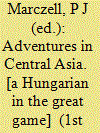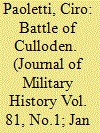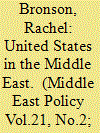|
|
|
Sort Order |
|
|
|
Items / Page
|
|
|
|
|
|
|
| Srl | Item |
| 1 |
ID:
079365


|
|
|
|
|
| Edition |
1st ed.
|
| Publication |
New Delhi, Pentagon Press, 2007.
|
| Description |
xx, 223p.hbk
|
| Standard Number |
9788182743036
|
|
|
|
|
|
|
|
|
|
|
|
Copies: C:1/I:0,R:0,Q:0
Circulation
| Accession# | Call# | Current Location | Status | Policy | Location |
| 052634 | 958/MAR 052634 | Main | On Shelf | General | |
|
|
|
|
| 2 |
ID:
151310


|
|
|
|
|
| Summary/Abstract |
The battle of Culloden, an encounter between armies of the Hanoverian and Stuart dynasties on a Scottish moor in April 1746, traditionally has been treated in the historiography as a strictly British affair with exclusively British consequences. This essay seeks to place the battle in a much broader framework, suggesting that it had long-term implications for not just Britain, but for much of the rest of the world as well. It contends that it is not unreasonable to argue, for example, that if the battle had been lost by the Hanoverians, the United States probably would not exist today and French would be the primary language spoken in North America.
|
|
|
|
|
|
|
|
|
|
|
|
|
|
|
|
| 3 |
ID:
015779


|
|
|
| 4 |
ID:
077777


|
|
|
|
|
| Publication |
2007.
|
| Summary/Abstract |
This article gauges how plausible deep historical explanations are in accounting for the emergence of particular types of parties in post-communist Poland, Hungary, and the Czech Republic. Generating and testing hypotheses from the centuries-long historical logic of Lipset and Rokkan's model of cleavage and party development, it finds that the historical foundations of post-communist parties may be deeper than most analyses assume and that the influence of the communist era may be less than is often believed. While a full understanding of the emergence of post-communist party types requires both historical and non-historical explanations, historical ones should not be underestimated
|
|
|
|
|
|
|
|
|
|
|
|
|
|
|
|
| 5 |
ID:
172051


|
|
|
|
|
| Summary/Abstract |
This article presents new, original data on food riots and protests between 2005 and 2015 and explores the societal conditions in which these events occurred. These conditions include a range of economic, social, demographic, political, and household consumption factors, with reference to a number of conflict theories. The article explores whether instability related to food prices should be seen as an expression of hunger within the most vulnerable and deprived societies, or a demonstration of grievances rooted in broader political contestation. The article also contributes to debates about the methodological challenges of focusing on food prices as a factor relevant to instability and conflict, and the question of whether food riots have significance to broader debates about conflict.
|
|
|
|
|
|
|
|
|
|
|
|
|
|
|
|
| 6 |
ID:
066379


|
|
|
| 7 |
ID:
152908


|
|
|
|
|
| Summary/Abstract |
After 1660, writes historian Michael LaCombe, Englishmen depicted Native Americans as “tragic, hungry, and helpless victims.”1 A century later, Anglo-Irishman William Johnson, Superintendent of Indian Affairs, did otherwise. In describing the increased expense of Indian alliances in 1765 he complained, “All the Bull feasts ever given at Albany would not now draw down Ten Indians.”2 LaCombe’s English writers portrayed powerless, starving Indians, while Johnson worried about powerful ones uninterested in feasting. Historians must reconcile these contrasting portrayals. This article examines several ideas about Native hunger—that of the starving and useless mouth, that of the supplicant using hunger as a metaphor, and that of the warrior capable of doing without European provisions—which emerged over more than a century of Native and non-Native diplomacy. It contends that British misunderstandings of Iroquois (otherwise known as Six Nations, or Haudenosaunee) hunger during the American Revolution enabled Indians to use food diplomacy to retain power during a period that historians have characterized as disastrous for Natives.3 Indians accepted provisions and then refused to do what their allies wished, they explicitly ignored their hunger, and most significantly, they destroyed their allies’ food.
|
|
|
|
|
|
|
|
|
|
|
|
|
|
|
|
| 8 |
ID:
133621


|
|
|
|
|
| Publication |
2014.
|
| Summary/Abstract |
Recent events in Ukraine have brought America's growing energy independence and its resulting geopolitical influence into sharp relief. Almost immediately after Moscow invaded Crimea, leaders on both sides of the Atlantic began urging Washington to strengthen its allies and weaken Russia's dominance by deepening its energy ties to Europe. In a letter sent to House Speaker John Boehner and Senate Majority Leader Harry Reid, the ambassadors from Poland, Hungry, the Czech Republic and Slovakia called on the United States to strengthen its "gas-to-gas competition" to enhance European energy security.1 President Obama echoed their call: "Energy is obviously a central focus of [American and European] efforts" vis-à-vis Russia.2 The United States has an opportunity to use its newfound energy assets to shape the political chessboard in ways unforeseen just a few years ago.
|
|
|
|
|
|
|
|
|
|
|
|
|
|
|
|
|
|
|
|
|